
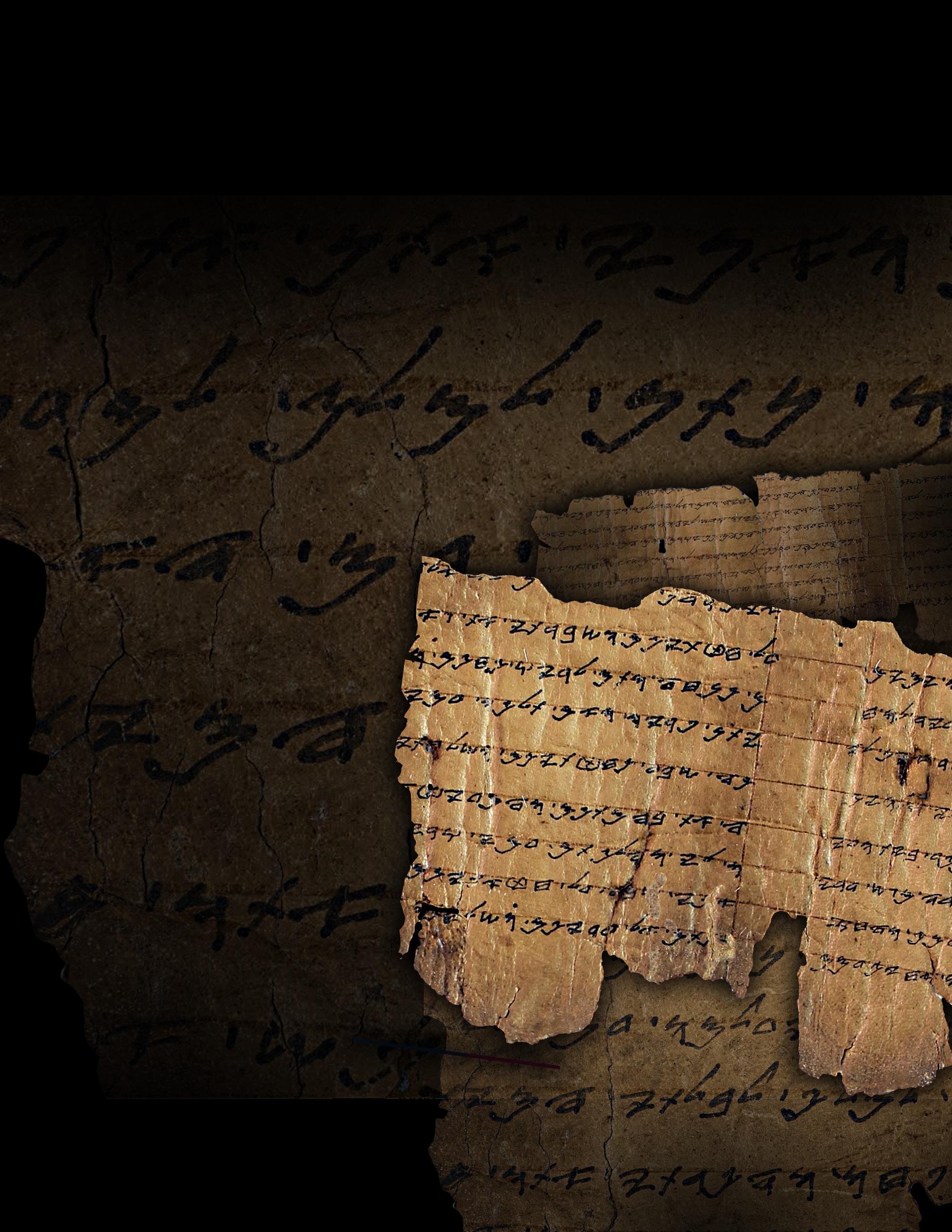
HEBREW BIBLE




HEBREW BIBLE

ANCIENT TEXT
RABBI MOSHE BEN-CHAIM

“Only when searching for God’s wisdom like silver will you find it.” (King Solomon)
• Immortality: The Drive
• Praying to the Dead?



• Are Good People Punished?
• The Fantasy of Wealth

A Tribute to my Father Chaim ben Naftali A”H

Just click any icon in







THOUGHTS
Following God’s rules, not man’s
RABBI MOSHE BEN-CHAIM
Deriving principles based on the Torah’s cases
RABBI REUVEN MANN
The sin of Moses hitting the rock
RABBI MOSHE BEN-CHAIM
Fundamental lesson’s of King David’s Psalm 49. A tribute to my father Chaim ben Naftali A”H
PARSHA
Extremes are sinful. Torah’s brilliant lessons.

“One must not inquire of ghosts, spirits or the dead. For anyone who does such things is abhorrent to God” (Deut. 18:11.12).
God abhors what is false, meaning one’s imagination (viz. ghosts, spirits and the dead interacting with the living). God gave us 5 senses precisely to distinguish between reality and imagination, and accept as true only the
former. Never has there been evidence of ghosts or spirits, nor of the dead communicating or displaying power. Through this lack of evidence, God wishes we dismiss such imagined nonsense as fallacy. For one who believes in what is not evidenced, violates God's will, and lives in a fantasy world. He believes he can rely on imagination, only to quickly learn that imaginations do not exist, cannot answer him, and lead him to fail miserably.

Torah is complete, it does not omit fundamental truths. Does it refer to praying to the dead or placing notes in graves?
Caleb saw the other spies (except Joshua) were evilly suspect of God’s promise of Israel. Caleb knew they would attempt to sway him to their corrupt rebellion. Caleb sought to strengthen his conviction in God’s oath to give Israel to the Jews. Therefore, he traveled to Hebron (Num. 13:22) where the patriarchs and matriarchs are buried. As that visual of their graves will evoke memories of their righteous lives that earned them God’s promise of Israel, and will emotionally fortify his opposition to the evil spies. At their graves, Caleb prayed to God, not the dead patriarchs and matriarchs (Tosfos, Sotah 34b).
Did Saul actually converse with the dead Samuel (Sam. I, 28:15-19)? Radak provides a lengthy explanation that Saul merely “imagined” a discussion with the dead Saul. Torah recorded that imagination as literal, precisely to convey the degree of reality Saul attributed to his imagination. Here, Torah forces the reader to ask, “Was Saul actually talking to a dead Samuel…did Samuel truly reply?” This absurdity leads the reader to ask why Torah articulated Saul’s imagination as literal. But that is Torah’s style: to deliver its message to the
reader with the greatest degree of impact. You must note that the desperate Saul did not seek out a Jew, but an idolatrous gentile to “raise the dead,” as Jews don’t practice nonsense. Genesis 32:25 says, “Jacob was left alone and a man wrestled with him until the break of dawn.” As Jacob was alone, this “man” cannot be literal, but refers to a part of his personality with which he battled. Again, Torah conveys that our personalities contain portions that oppose us, as if we are battling a literal person.
“Why do we go to the cemetery? In order that the dead will seek mercy for us” (Taanis 16a).
In light of the Torah prohibition above, this allegory in Taanis is interpreted to mean that our attachment to our forefathers’ values (visiting their graves) earns us God’s mercy. For visiting their graves means we ascribe to their values. This allegory does not say to “communicate with the dead” which is undeniably prohibited, but only to visit their graves. One who visits the graves of the righteous wishes to emulate their values. God sees this and has mercy upon that person. So the way that the dead “have mercy on us” is not by any action, as they
are dead. But it is “our” action, identifying with them, which earns us God's mercy. It’s an allegory. So we have no Torah precedent to circumvent God and seek man instead. This is so crucial. We must identify the main message of this prohibition: God can do all. We don’t need men as intermediaries to God. God hears anyone from anywhere. Selichos teaches, “He who answered Mordechai and Esther in Shushan,” “He who answered Jonah from the belly of the fish,” “He who answered Daniel in the den of lions” and all those listed cases. God can do all, so seeking men—whether alive or dead—rejects this fundamental that all we need is God.
Seeking man distances us from God, the opposite of our intent. Isaiah 2:22 reads, “Cease to glorify human beings, who have only a breath in their nostrils! For by what do they merit esteem?” Isaiah urges man to cease his infantile search for security in frail humans, and find security in God. “Breath in their nostrils” conveys man’s dependent nature: without air he dies. Man can’t sustain himself, so it’s foolish to pray to him—alive or dead—certainly as God created man, we must turn to the greatest power for our needs. ■
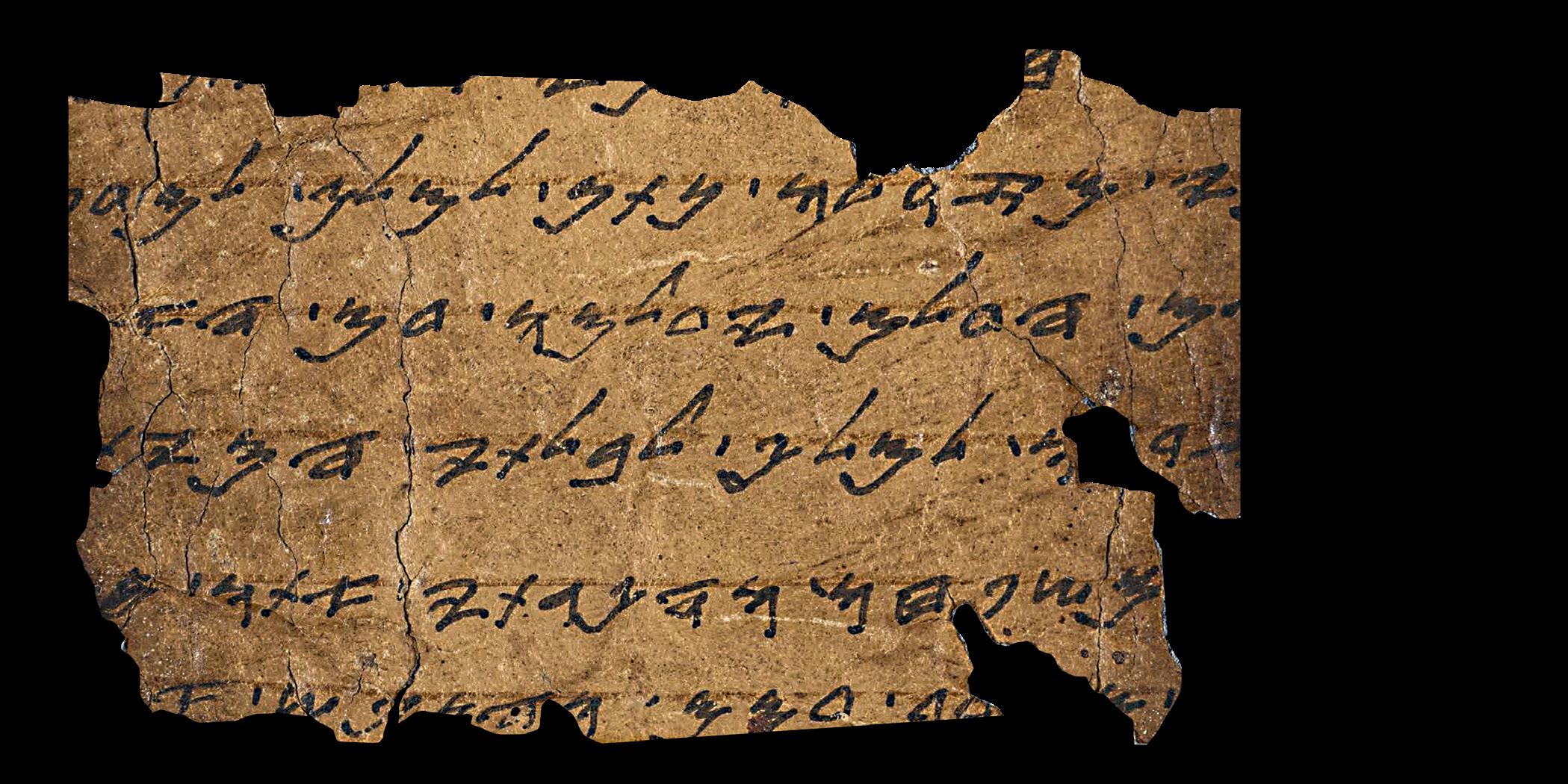




RABBI MOSHE BEN-CHAIM
Greater sins deserve greater punishments and deterrents:
“Once permission is given to the destroyer, it does not distinguish between the righteous and the wicked” (Talmud Sanhedrin 60a).
Of course, the wicked are always punished. So the new idea shared above addresses the destruction of the righteous people. But does this mean these righteous people are completely free of guilt? This principle is applied to the Egyptian Passover where the Jews were warned not to leave their houses at the risk of being killed along with the Egyptian firstborns. If they exited their
homes, they sinned against God’s command and thus, would be destroyed (Rashi, Exod. 12:22). So the “righteous” doesn’t mean they were without guilt. Would a 100% righteous person without sin be swept away when God makes a general decree of destruction? Is that justice? Noah’s salvation indicates he was “righteous in his generation” (Gen. 7:1). Lote had character flaws, yet perhaps he was saved from Sodom’s destruction so his uncle Abraham would not suffer disgrace. And Radak says about the messianic war of Gog and Magog (Isaiah 26:20) that one should repent so as to be saved. Certainly one with no sin would be saved.

Ezekiel addresses the destruction of the
“Pass through the city, through Jerusalem, and put a mark on the foreheads of the persons who moan and groan [with remorse] because of all the abominations that are committed in it.” (Ezekiel 9:4)
“Kill off graybeard, youth and maiden, women and children; but do not touch any person who bears the mark. Begin here at My Sanctuary. So they began with the elders who were in front of the House.” (Ibid. 9:6).
Shabbos 55a elaborates:
The Holy One, Blessed be He, said to the angel Gabriel, “Go and inscribe a tav of ink on the foreheads of the righteous as a sign so that the angels of destruction will not have dominion over them. And inscribe a tav of blood on the foreheads of the wicked as a sign so that the angels of destruction will have dominion over them.” The attribute of justice said before the Holy One, Blessed be He, “Master of the Universe, how are these different from those?” He said to that attribute, "These are full-fledged righteous people and those are full-fledged wicked people.” The attribute of justice said to Him, "Master of the Universe, it was in the hands of the righteous to protest the conduct of the wicked, and they did not protest.” He said to that attribute, "It is revealed and known before Me that even had they protested the conduct of the wicked, the wicked would not have accepted the reprimand from them. They would have continued in their wicked ways.” The attribute of justice said before Him, "Master of the Universe, if it is revealed before You that their reprimand would have been ineffective, is it revealed to them?” [Meaning the righteous were guilty for not having tried to correct the wicked] And that is the meaning of that which is written, "Slay utterly old and young, both maid, and little children, and women; but come not near any man upon whom is the mark; and begin at My Sanctuary” (Ezekiel 9:6). And it is written in that same verse, "Then they began with the elderly men who were before the house.”
First (9:4) we see God initially wishing to protect certain righteous people called, “tzaddikim gamurim; fully righteous” even during a punishment of the worst sin of idolatry. Thus, verse 9:4 says God’s mercy did not wish to harm these righteous people. But verse 9:6 concludes, “So they [destructive angels] began with the elders,” meaning God retracted his mercy from the elders. For although they had not sinned with idolatry, they sinned by not admonishing others to abstain from idolatry (see Rashi). Thus, no one fully righteous was killed.
Under some circumstances, the righteous earn God's providence and protection, as Torah depicts regarding numerous personalities. But under severe circumstances, they are swept away in catastrophe just like the wicked people for some guilt they possess. It is only regarding severe sins with threats of harsh punishments intending to deter such sins, that when violated, the righteous too are killed. The justice is that even the righteous people are justifiably killed, as they have the knowledge with which they should have educated the masses to prevent great sins. Failure to rebuke the masses was the reason why during the First Temple, God killed these Jews, starting with the righteous. Talmud says, “Not only are the righteous killed too, but they are the first to be killed” as stated, “I will kill righteous and wicked” (Ezek. 21:8). In this verse, the righteous are mentioned first, teaching that they were killed first. Similarly, Sodom and the other cities were destroyed due to the lack of good influence. Had there been at least 10 righteous people, God would have spared them. When God revealed to Abraham His plan to destroy
the cities would all be destroyed (Gen. 18:32). However, God didn’t disagree with Abraham’s emphatic conviction that the fully righteous will always be saved.
The fact that the destroyer does not distinguish between the righteous and the evil people indicates guilt of the righteous people. Meaning, with proper leadership, the masses will respect the leaders. That is human nature. But the leaders who fail the people by not teaching Torah, will not be immune to punishment. Similarly, the Jews who didn’t listen to God and exited their home during the Egyptian Exodus would be killed, as “the destroyer does not distinguish between the righteous and the evil.” Meaning, when the righteous have some guilt, they too will suffer. But as Radak says on Isaiah 26:2, “Those who repent fully will escape harm.” Certainly one who is righteous without sin will be spared.





All books depict history, facts, theories, fiction or poetry. No book is coded with hidden messages beyond the words or patterns revealing marvels. But the Bible (Torah) was written by God, and is “coded.” The order of verses, use of certain phrases, apparent contradictions and other Biblical patterns are pur poseful clues to God’s wisdom.
This book unveils those patterns and shares the hidden messages.





This week's Parsha, Chukat, focuses to a large extent on the subject of death. The opening section deals with the Parah Adumah (Red Heifer) which is indispensable in the process of securing purification from contact with a corpse. Although today we cannot attain ritual purity due to the absence of the Temple, this does not present a practical Halachic (Jewish legal) issue in our times.
The Parsha recounts the death of Miriam and her brother Aharon. The third member of this illustrious family, Moshe Rabbenu commits the sin for which he was barred from leading the Bnei Yisrael (Children of Israel) into Eretz Yisrael (the Land of Israel). The Torah describes the transgression in very harsh terms and attributes to Moshe and Aharon a lack of trust in Hashem and a failure to sanctify Him in the eyes of the Jewish People. However, if we look at the actual account, it is difficult to see where they erred. When the people arrived in the Wilderness of Tzin there was insufficient water for humans and animals. The people were very agitated and rose up to complain. But they uttered some terrible things. They said:
“And if only we had perished as our brethren perished before Hashem! Why have you brought the Congregation of Hashem to this wilderness; to die there, we and our animals? And why did you bring us up from Egypt to bring us to this evil place;? — not a place of seed, or fig, or grape, or pomegranate; and there is no water to drink!” (BaMidbar 20:3-5)
In response to the need for water, Hashem commanded Moshe to take his staff and together with Aharon gather the entire people:
“And speak to the rock before their eyes, that it shall give forth its waters. You shall bring forth for them water from the rock and give drink to the assembly and to their animals.”
(BaMidbar 20:8)
It would appear that Moshe and Aharon then did what they were told. When the nation was gathered around the rock, Moshe addressed them and said,
“Listen now, O rebels, shall we bring forth water for you from this rock? Then Moshe raised his arm and struck the rock with his staff twice; abundant water came forth and the assembly and their animals drank.” (BaMidbar 20:10-11)
According to Nechama Leibowitz, there are no fewer than twelve different interpretations as to what the sin consisted of, among the major commentators. The classic understanding expressed by Rashi is that Moshe was instructed to speak to the rock which would produce water in response to his words, and not to strike it. Rashi explains (BaMidbar 20:12):
“To sanctify me – Had you [Moshe] spoken to the rock, and it had brought forth water, I would have been Sanctified in the eyes of the people, for they would have said: ‘If this rock – which doesn’t speak nor hear, and has no need for sustenance – fulfills the Word of G-d, how much more so must we!'”
It seems, according to this, that the objective of this miracle was not just the practical one of providing water, but, additionally, to teach a lesson about the absolute necessity of fulfilling the Word of Hashem. This is because hitting the rock instead of speaking to it, while it brought forth water, was deemed to be a failure to properly carry out Hashem’s instructions. The demonstration, according to Rashi, rests on the comparison between inanimate objects and humans. Of course, no one believes that the rock has a mind and willfully decides to follow G-d’s instructions. But it meant that Hashem’s Will relates to everything in Creation. There is no detail that is beyond the scope of His Knowledge, which is absolute. Furthermore, His Will sustains everything that is in existence. If that is the case with mere rocks how much more so does His Will relate to very complicated beings like humans, who have great needs and are dependent on Him for their wellbeing. How much more so is it vital for us to live in line with His Will?

Still the question persists, what would cause Moshe who otherwise had the most precise understanding of Hashem’s words to err in this case? In my opinion, we must look at the context in which this error occurred. This story takes place in the fortieth year of their stay in the Wilderness. The period of punishment for the sin of the spies had concluded. It was now time to move on to the long awaited entry and conquest of the land Hashem had promised to the Avot
However, just at that time the people, due to the absence of water, broke out in excessively bitter complaint and actually accused Moshe of bringing them out of Mitzrayim (Egypt) in order to die in the Wilderness. This clearly had an effect on Moshe and aroused his fears that they would not be worthy to inherit Eretz Yisrael or to courageously fight for it. This caused him to deliver a speech of rebuke to them, at the rock. He believed that this is what they needed at the time, and interpreted the Prophecy of Hashem to be in line with his own sense of how it was necessary to proceed at this point. However, he was clearly mistaken, for this was not the appropriate understanding of what Hashem had
The sin of Moshe, in my opinion, was not that he deliberately refused to execute faithfully Hashem’s instructions, but that he became confused as to what he had been told to do. He did not approach the Nevuat Hashem (Prophecy of G-d) with a totally clear mind, but instead, brought to it his underlying worries about the state of Klal Yisrael (The Congregation of Israel). Because he cared so deeply about the success of their national mission, which would begin with the conquest and settlement of Canaan, he was mistaken in his interpretation of Hashem’s words.
I have always found Rashi’s profound explanation difficult to comprehend from a practical perspective. Rashi seems to be saying that the sin of Moshe consisted in his deviating from the command of Hashem to speak to the rock instead of hitting it. But why would Moshe, the faithful servant, not do exactly what he was told? Time and again the Torah repeats that Moshe constructed every aspect of the Mishkan (Tabernacle) exactly as Hashem had instructed without instituting any change, however slight, of his own. What motive would he suddenly have to hit the rock when it was G-d’s Will that he should speak to it?
I would like to present a possible explanation of this incredible Peshat (explanation). One must say according to this idea that Moshe had a mistaken understanding of what Hashem wanted him to do. Hashem had told him to take the special staff with him, and this indicated that he was to use it. Hashem said “And speak to the rock...” The Hebrew preposition ‘El’ can mean ‘to’ or ‘at,’ potentially causing Moshe to misunderstand Hashem’s command.
Thus, it is possible to understand that Hashem wanted Moshe to speak to the people when they were gathered by the rock and not that Moshe was to speak to the rock. According to this understanding of the instructions, Moshe proceeded to speak to the people by the rock and then use the staff he had been instructed to bring along to hit the rock and thus bring forth water.
There is a lot we can learn from this story, even though we are exceedingly far from the level of Moshe Rabbenu. It underscores the importance of accuracy in understanding the Will of Hashem which has been revealed in His Torah. Our task is to study it carefully and honestly, and not search for explanations that are rooted in our personal desires and agendas.
Scrupulous honesty, objectivity and careful adherence to Hashem’s Will as it has been conveyed in His Torah and transmitted via the genuine Baalei HaMesorah (Masters of the Oral Law) is the sine qua non of spiritual growth and perfection.
May Hashem grant us the humility to study His Torah with a clear mind, guiding us to obey and serve Him.
Shabbat Shalom. ■
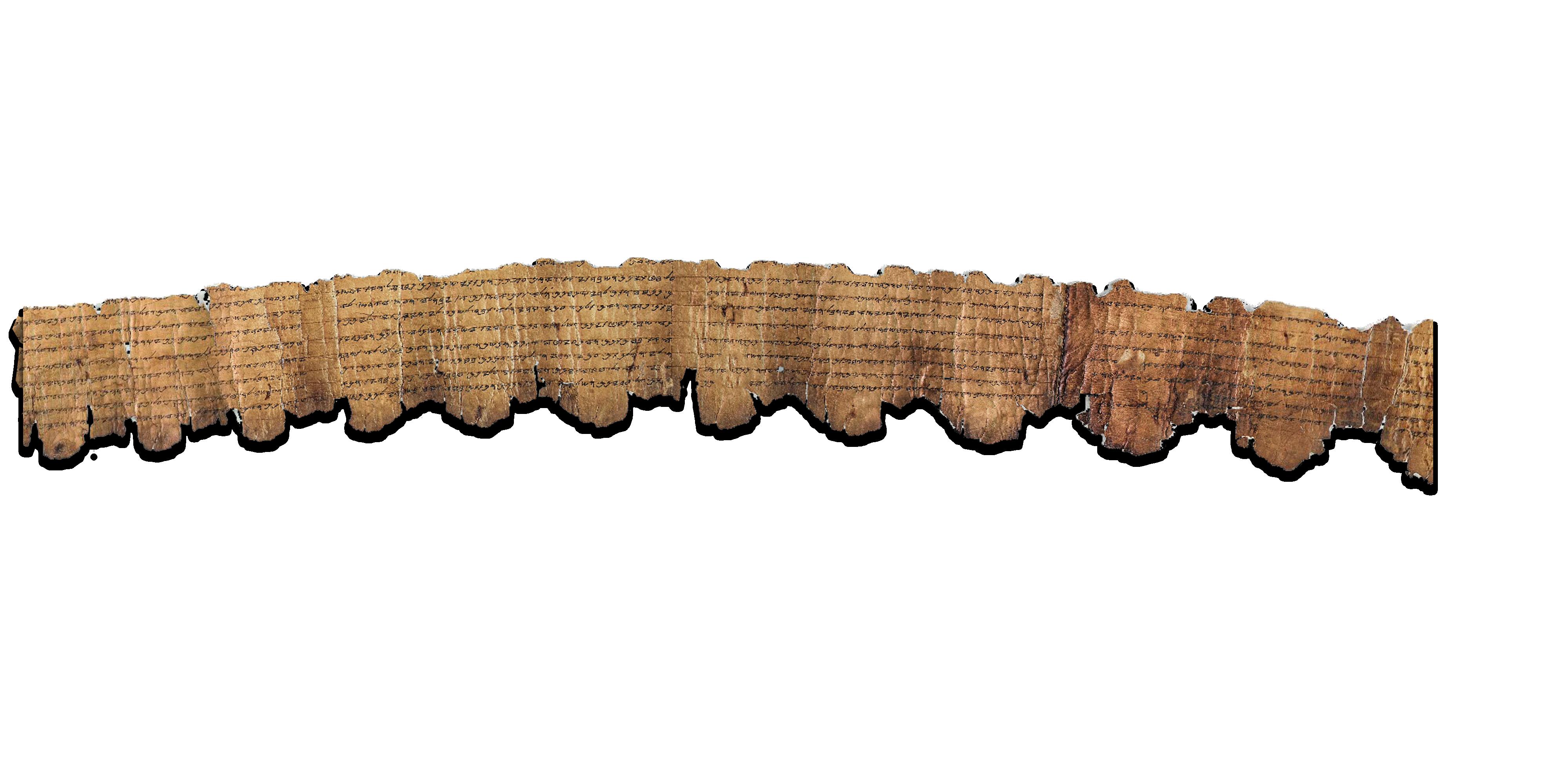


rich, when the honor of his house increases. For in death he will not take it all, when his honor too follows his death. Though he blesses himself in life, but [in truth] you are praised if you do well to yourself. He will join his fathers’ generation, he will never see daylight. Man whose soul does not understand will be like the animals.”
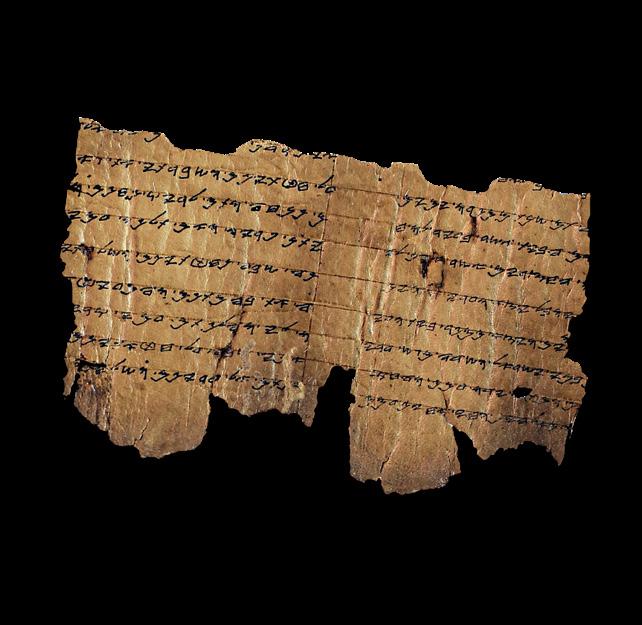
This Psalm addresses man’s false overestimation of wealth as that which secures his immortality. But our wise king and psalmist King David rejects man’s foolish value of wealth, and its fantasies. Based on reality, he teaches us that man is wrong. We understand man is disturbed by death: it’s when all ends and what awaits is completely unknown. Furthermore, lifeless bodies are disturbing, certainly our own lifeless state. Man might think after death, he is then under the ground, or that he ceases to exists. As all man knows is this earthly existence, he can’t form a clear picture of what death is. But with God’s answers through His leaders and prophets—through Torah—man can approach death realistically and with anticipation. Maimonides teaches, “How very much did David desire the life of the world to come as implied by "Had I not believed that I would see the goodness of God in the land of the living! (Psalms 27:13)” (To better appreciate insight in to the afterlife, study Maimonides’ Laws of Repentance, chapter 8.)
Let’s now understand Psalm 49 above, that man imagines wealth as that which secures immortality. King David teaches that no man escapes the immortality fantasy, be he of any nation, rich or poor. Meaning, it’s part of the human design, where societal status is irrelevant. Thereby, King David directs us where to find the false belief: in our psyches. It is of a psychological need to seek wealth and immortality. Man thinks a rich person has security, that he won’t die. This error is because with great wealth comes unlimited purchases that can continue without end. The quantity of wealth tricks one to believe such riches can’t be exhausted, and one has all the time in the world to spend it. That’s why man desires great wealth, he associates it with immortality. Man thinks, “If I have unlimited wealth, my spending is also unlimited, making my life unlimited.”
I will commence my riddle with the harp.
King David knows very well that man is disturbed by death, so he doesn’t approach it head-on, which would shock man. So he opens with a riddle:
Why shall I fear in the evil days, when the sins of my heels surround me?
He calls death “evil days” as that’s something man can imagine, meaning a time he is still earthbound. But he eventually reveals that he refers to death. For the same sensitivity, King David first talks about redeeming a brother—not yourself—from death.
Shall man live eternally and never see the grave? For one sees that the wise die, that the foolish and ignorant both perish, leaving their wealth to others. In their hearts they feel their homes are eternal.
King David asks man to accept the reality of death, and that wealth is not taken to the grave. He critiques the imagination that great homes provide immortality. A home is where one spends most of his life, and if his home is a great structure that will endure hundreds of years, man thinks he will too. Man attaches his lifespan to the lifespan of his home, it’s a strong identification.
This is the way of the wicked and those after them who in their mouths praise the wealthy
King David says this belief is a “way”, a
philosophy, it’s widespread and an accepted “way of life.” Not only for him, but for “those after them.” The blind follow the blind.
But God will redeem my life from the clutches of the grave for He will take me. Fear not when man grows rich, when the honor of his house increases. For in death he will not take it all, when his honor too follows his death [to the grave]. Though he blesses himself in life, but [in truth] you are praised if you do well to yourself [to your soul].
King David concludes with reality, the true philosophy: the afterlife is eternal and good. If one does good to his soul, this secures the afterlife, which is not physical, where wealth does not exist: “You are praised if you do well to yourself.” “Praised” means you act in reality by valuing the good for the soul which is the only part of you that survives after death. And doing good for the soul while alive is the greatest life here as well. The greatest minds said that physical pleasures, wealth, and fame don’t compare to the enjoyment of wisdom: “All desirous things don’t compare to it [Torah study]” (Prov. 8:11).
The lesson is not to follow your emotional sense that money provides immortality. Don’t feel men with great wealth have greater security, as all men die, no man takes his money with him. It’s difficult to escape the grips of our society that praises wealth and fame as the ultimate life. But instead of following today’s foolish society, follow the great Torah minds.
My father never aspired for wealth, he never discussed money. He earned his basic needs. He never suggested what career I should take, to be successful, to be a lawyer or a doctor. When I began studying Torah, he supported me financially for 10 years in the yeshiva dorm, never suggesting, “It’s time to stop learning and work.” When I shared with him my excitement at my rebbe’s Torah ideas, he never expressed any sign of jealousy or resentment that his son now has a new hero, his rebbe. You’d think a father wants to remain his son’s hero. Not my father. He patiently listened with a smile to all the Torah I repeated in my rebbe’s name. He was so delighted that I found my greatest passion in Torah study, that he never resented my rebbe, but greatly respected him. Any move I made, my father supported and got me interviews when I started some side work. He
respected my decisions in word and in deed. After he passed away this Shavuos, I had time to reflect. I realized it was because he never valued wealth that I too never chased it. This enabled me to have no conflict when choosing a Torah life, and not pursuing a career as a main focus. My father presented me with a model of life that did not idealize wealth or romanticize a grandiose career. I was enabled to value what is truly our purpose: Torah study and education. My father went on to engage more in Torah himself, sharing his Torah thoughts and questions in the Jewishtimes. He was thrilled to have a platform to broaden his audience. He never spoke about people, so he never spoke Lashon Hara. He was honest in business. He loved making people laugh, even while in assisted living these past 3 years. His motto was, “Its’ my job to make people laugh.” And he also said “Thank you” to everyone profusely. Upon my visits a number of times each week, I asked him, “Dad, how are you feeling today?” Most days he replied, “I’m doing just fine.” Thank God for that. God made him strong, and with dignity so he wished to maintain an appearance of dignity and rarely complained. When younger, my father gave us enjoyment and memories with surprise gifts like a new backyard pool, car trips, fishing trips, winter sleigh riding, and great summer Sundays at the schoolyard. He was never sick, never in the hospital, lived until 91, and he passed quickly in 12 hours Erev Shavuos. Neither he nor I suffered a long goodbye or a tortuous end-of-life, bed-ridden sickness. Thank You God for my father, my mother and my brother. They all feared God. ■


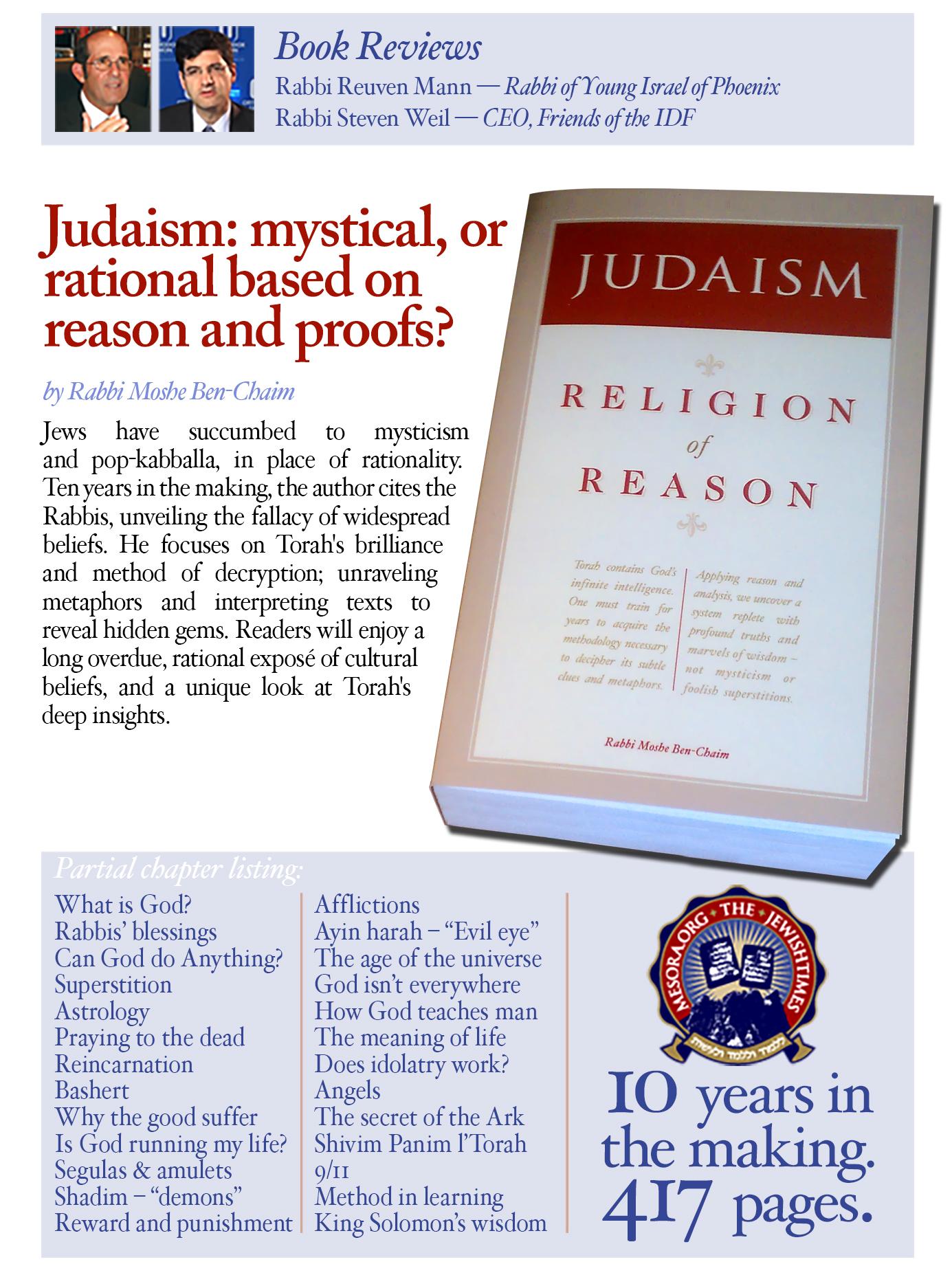
Is Judaism mystical, or is it rational, based on reason and proofs?





Mention “religion” or “God” to some people, and they cringe or change the subject. But discuss science, and you evoke no emotional response. Why?
Unfortunately, Bible (Torah) is not viewed as valid and true, as is science. This is because Bible asks us to conform our beliefs, actions and values; Bible imposes walls that impede the attainment of our desires. Bible feels authoritarian, restrictive and unpleasant, ripping us away from our freedom to chase any pleasure or desire; we cant tolerate losing the “free” part our freewill. On the other hand, science relates to the physical world and not to how we must think, feel or act. Science is impersonal, evoking no resistance from us, and it’s quite tangible and “real.” Scientific fact does not compete with our wishes. It is Bible’s opposition to our feelings and its assumed irrelevance to our happiness that generates a resistance to explore Bible and value it. We feel religion is optional, while science is fact. However, our feelings do not accurately assess what’s real and what provides happiness. Bible’s restrictions are no grounds for viewing it any less valid and beneficial than science. God created both Bible and physical creation; both equally represent what is real and beneficial. Whether a subject matter relates to the physical world like geology and biology, or if the subject governs our practices like justice and philosophy, all subjects are equally God’s creations. All subjects are created for man’s benefit, as the greatest minds have always taught. We need to get passed our emotional reluctance to Bible’s laws, and view it on par with science. To be happy, we follow natural law and don’t defy it; leaping from a cliff or injecting poison leads to death. Just as defying natural law has consequences, ignoring God’s lessons for attaining happiness too ends in dissatisfaction and unhappiness. King Solomon’s book Ecclesiastes (Koheles) addresses this. He studied human happiness and sadness, and found that human emotions lead to poor

R ABBI MOSHE BEN-CHAIM

Bible, driving us to be dissatisfied with mediocre and infantile Biblical explanations. Just as we would not accept a theory of “accidental arrangement” to explain the perfectly complimentary systems within the body (circulatory, respiratory, digestive, etc.) we must equally not accept childish, mystical or simple Biblical explanations. Bible and science are not simple, but are precisely and brilliantly designed. I will now give you an example of Bible’s astonishing wisdom. It is amazing.
Burning the Red Heifer is a “chok” (Biblical statute), which is misunderstood as a law bereft of reason. On the surface, burning a cow of a certain color seems quite odd, and even primitive. Rashi appears to comply with this sentiment that a chok is without reason:
Because Satan and the nations of the world taunt Israel saying, “What is this command and what is the reason for it?” Therefore it is written ‘chukas’: “A decree from before Me (says God) and you have no permission to be suspect about it [to find a flaw]." (Rashi on Num. 19:2)
A simple reading of Rashi would imply not to think into this law. But we must understand God’s plan behind His 2 realities: the natural world and Bible.
His universe reveals brilliance: in material substance itself, in its designs, and mostly in natural law. This indicates God’s desire to share His wisdom with beings that can perceive it. All God’s acts and creations contain the greatest wisdom. And one of the most astounding creations is the human intellect. Therefore, to suggest that chukim (statutes) are bereft of any wisdom, denies this fundamental that God permeates all with His wisdom, as He desires man to derive great joy by appreciating His wisdom. Both, nature and Bible were designed with the intent that man recognize the Creator’s abundant brilliance in both.
Rabbi Israel Chait once distinguished between mitzvah and a chok: Mitzvah is a law which a person would arrive at with his own thinking, such as murder and stealing. But chok is a law that man would not arrive at on his own, such as
wearing black boxes (tefillin), resting on Sabbath as a way of recognizing God, or laws of kosher. However, this does not mean that these laws do not share the same brilliance as every other law. Chok is distinguished from mitzvah only in the fact that man would not have innovated such a structure, but not that they are bereft of great wisdom. What then is the reason behind the Red Heifer? Rabbi Israel Chait taught that a human being cannot state with any certainty what the primary goal is of any mitzvah or chok [only God knows for certain], but we can identify its benefits.
What Rashi means by not being “suspicious” about this law, is that one should not view it negatively or emotionally, or make one’s understanding the determinant of following it. But certainly one should intelligently investigate every law and seek its profound ideas, just as one seeks wisdom in nature. We learn that King Solomon knew the reasons for all laws—including chukim—except for some element of the Red Heifer. That means that he understood the ideas contained all other chukim. Thus, chok—a statute—has reasons like all other laws.
It is also notable that the beginning of Rashi where he says that Satan (i.e., man’s instincts) and the nations of the world (who are lacking understanding) are the only ones that find fault with the Red Heifer. The deduction is that the intellect and the Jewish nation do not find fault with it. This supports the idea that even a chok reveals God’s brilliance. Let’s now understand the Red Heifer.
I understand that a person who speaks evil and degrades others (Lashon Hara) has committed a crime. Thus, remedial action is required. But what about fulfilling a mitzvah of burying the dead: why is there a response of sprinkling the ashes of a Red Heifer on one who was in contact with the deceased? Meaning, why should a mitzvah of burial require a remedial act? Remedy for what? Additionally, why were the Jews in Egypt who fulfilled the command of the Paschal Lamb required to paint their doorposts and lintels with the lamb’s blood? In
these two cases, the Jews fulfilled God’s command. A remedial act suggest the presence of some flaw in mitzvah. But that is incoherent. Again, Torah has no remedy for one who prays, or makes a blessing, or performs any other mitzvah: the mitzvah is constructive, and what is positive, cannot require a remedy! Remedy only follows a negative or a destructive matter. Yet, one who buries the dead or sacrificed the Paschal Lamb—God’s commands—requires some additional act. It’s difficult to grasp a remedial need for a mitzvah. As always, God’s generous clues are found in all mitzvahs. When burning the Red Heifer into ashes, the Torah commands us to throw into its flames a cedar branch, a hyssop plant, and a red string. Very unusual. Ibn Ezra writes:
This [the cedar, hyssop and red string] is just like the leper, and there I hinted to a principle (Ibn Ezra, Num. 19:6).
Ibn Ezra is referring to his commentary on Leviticus 14:4:
Behold, the leper, the leprous house, and the defilement by contact with the dead are related…and behold, they too are similar to the form of the Egyptian Exodus.
Just as the cedar branch, hyssop plant, and the red string are remedial for one who was in contact with a dead person (Red Heifer), Leviticus 14:4 commands that the leper—the speaker of evil—in a remedial practice which also include these same three items. Nowhere else in Torah are these found. Quite intriguing! What’s the connection between death and evil speech?
Regarding the leper, two birds are taken; one is killed, and the live bird together with the cedar branch, a hyssop plant, and a red string are dipped in the dead bird’s blood and the live bird is let loose over a field. Regarding the Exodus, Ibn Ezra refers to the practice of dipping the hyssop in the lamb’s blood and painting the doorposts and lintel. Here too the hyssop is used, but we note the omission of the cedar branch and red string.
Ibn Ezra points us to three seemingly unrelated institutions that share identical elements,
a cedar branch, a hyssop plant, and a red string. These three are burnt with the Red Heifer, they are bloodied in connection with the leper, but the hyssop alone is used in connection with the Passover Exodus during the plague of the firstborns, as the Torah says:
And you shall take a bunch of hyssop, and dip it in the blood that is in the basin, and strike the lintel and the two doorposts with the blood that is in the basin; and none of you shall go out of the door of his house until the morning. For the Lord will pass through to smite the Egyptians; and when He sees the blood upon the lintel, and on the two side-posts, the Lord will pass over the door, and will not suffer the destroyer to come in unto your houses to smite you (Exod. 12:22,23).
The Rabbis note that the hyssop is the smallest plant, and the cedar is the largest. What is that clue?
My dear friend and Torah educator Jessie Fischbein said, “Death creates distortions.” I thought about her words and immediately realized she was keying in to the common denominator. All three cases deal with death. The Red Heifer removes ritual impurity from one who was in contact with the dead; the leper’s speech was a crime of character assassination (the Rabbis teach evil speech equates to murder), and the lamb’s blood saved our firstborns from the Plague of Firstborn Deaths. In all three cases, a person was somehow related to death. The fact that all three cases require some remedy, indicate that without that rite, man is left in unacceptable conditions. What are those conditions?
Interesting is that once Adam sinned in the Garden of Eden, God feared he would eat of the Tree of Life and live forever. Therefore God placed cherubs (childlike figures) and a flaming spinning sword to guard the path to the Tree of Life (Gen. 4:24). Meaning, as soon as man sinned and he received the punishment or death, he immediately desired immortality. But God did not allow man to attain immortality through the Tree of Life. Instead, God struck a balance in man’s imagination: he would perceive his youth (cherubs) while also confronting the
unapproachable spinning sword which represented his death. God deemed it proper that in place of the extreme which Adam desired—immortality through the Tree of Life—an equilibrium be achieved.
He hath made everything beautiful in its time; also He hath set the world in their heart, so that man cannot find out the work that God hath done from the beginning even to the end (Koheles 3:11).
Ibn Ezra comments, “Everything beautiful in its time” refers to death in old age, while “He hath set the world in their heart” refers to the feeling of immortality. While death is a reality, and man cannot lie to himself that he is immortal, he also cannot face his death daily; it is too morbid. Man requires a sense of permanence if he is to live happily. A balance is again detected in this verse. How does this apply to our three cases?
Why does a person who performs a mitzvah of burying the dead require the ashes of the Red Heifer be sprinkled on him? He did nothing wrong, and in fact, he had no choice but to follow God’s command of burial. Furthermore, what is this strange practice?
It is not only errors or sins that require religious remedial practices, but even positive actions can negatively affect us. Jessie is correct: when one is in contact with the dead, we notice a denial. The tension at funerals evoked by facing one’s own death generates powerful denial. People find funerals difficult, and will laugh hard at the smallest drop of humor: a release of powerful negative emotions. Like Adam, funeral attendees “rush for the door” seeking immortality. But that extreme (the immortality fantasy) is as equally unhealthy as harping on our day of death, however true it is. Contact with the dead creates a denial that must be corrected. We are not allowed to deny our mortality. The “ashes” of the Red Heifer signify that a body—human or animal—is but dust or ashes. The body is not the definition of a human being. When confronting the dead, we must immediately correct our denial of our own mortality by embracing the ashes sprinkled on us, to remind us through
proxy, that just as the heifer is ashes, we too ultimately pass on. When faced with death, and we rush to deny it, we must strike a balance. The one who speaks evil “kills” another through character assassination. He did not treasure life, similar to one who murders. In his fantasy alone, through evil speech, he thinks he has “set things aright.” God does not approve of a person venting his aggression. This extreme requires a fix. The evil talker is smitten with leprosy, which Aaron said is like death (Num. 12:12). He must also shave his head, eyebrows and all hair. Why? One’s identity is very much tied to how he wears his hair, and his personality is expressed with his eyebrows. One would have difficulty distinguishing two people who were both hairless. It is safe to say that God created different hair colors and different hairstyles so people are distinguished. Now, when the leper is shaven and has no more hair just like infants at birth, his identity is lost to a great degree. His disregard of another person through his evil speech, is cured by his experiencing a loss of his own identity. This is compounded by the law that he must move outside of society. In Egypt, the Jews sinned through idolatry. Through the Plague of the Firstborns of those Egyptians and Jews who worshipped the lamb, their sins generated their deaths, and mitzvah (paschal lamb sacrifice) sustained life. The blood on the doorpost, through which the Destroyer might enter, focussed the dwellers on the truth that worshipping the deity of Egypt caused death, and our mitzvah of the destruction of the deity secured our salvation. The doorpost of the home, through which the Destroyer might enter was the optimal location for all to ponder the absolute truth that the lamb: idolatry is absolutely false.
Death is too morbid to face daily. But immortality too is false. The Rabbis teach the hyssop and the cedar represent two extreme poles of a spectrum: the small and the large in plant life. Sforno teaches the harm of living at the extremes of any attitudinal spectrum is expressed through these two species and the red string that represents sin[1]. (The objects could have been a large and small rock, but
something had to be used.) If one is too courageous or too cowardly, he cannot act properly at the appropriate time. A miser and spendthrift, or a sad or an elated person…any extreme is improper. King Solomon teaches that there is a time for every attitude (Koheles 3), meaning there are times not to follow that attitude. Thus, remaining at the pole of any emotional spectrum is harmful.
The Red Heifer teaches that denial of death or embracing death—either extreme—is sinful. The evil talker’s carelessness for another person is countered by his reduction of identity. But just as the Red Heifer’s ashes are remedial, and not to be focused on as a permanent ends, the evil talker too must regrow his hair. A remedial rite is temporary by nature, just enough medicine to cure the disease and redirect the person back to an equilibrium[2]. We now appreciate how these seemingly out-of-place plants point to a fundamental lesson and remedy.
But why is the hyssop alone used in connection with the Paschal Lamb? This is because there is no extreme in this case from which we must bounce back. Here, the death of the Egyptian deity is an absolute truth: idolatry is absolutely false. Thus, there is no lesson of two harmful extremes, as is so regarding the Red Heifer and the leper. And our fear of death has been calmed by the lesson that sin brings death, whereas mitzvah secures life. The purpose of painting the doorposts with blood has been explained.
Ibn Ezra teaches us that death affects man uniquely, it requires a unique address, and there are a few related Torah cases that share a bond, indicated by the use of the same three species. Proximity to death frightens man, causing him to flee to the opposite pole of immortality, but this extreme is false. Death is also used regarding the leper where he initially had disregard for life; he must be bent back to the other extreme where “he” loses his identity. But why did God choose the phenomenon of death per se to teach the harm of extremes? I feel this is due to the nature of the immortality fantasy…
Rabbi Israel Chait taught that King Solomon’s work, Koheles, is based on this fantasy. Meaning, all of man’s drives depend on the immortality fantasy. Man would not fantasize about any pleasure, plan, or sense any ambition, if he truly felt death was imminent. Under every emotion lies the feeling of immortality. Rabbi Chait wrote as follows:
“One generation passes, and another generation comes; but the Earth abides for ever (Koheles 1:4).”
The Rabbis teach, “A person does not die with half of his desires in hand. For he who has a hundred, desires to make of it two hundred.”[3] This means that the fantasy exceeds reality. King Solomon addresses one of the two fantasies that drive people. One fantasy is regarding objects or possessions. The second fantasy deals with man’s feeling of permanence. Man’s fantasies make sense, but only if he’s going to live forever. An idea has two parts: 1) the idea itself, and 2) the emotional effect of the idea. Every person knows the idea that he or she will die. But the emotional effect of death is usually denied. This enables man to believe his fantasy is achievable. It is impossible to live without the fantasy of immortality. It expresses itself one way or another.
The meaning behind this verse is that the average person looks at life as the only reality. He cannot perceive himself as a single speck in a chain of billions of people and events, where he plays but a minuscule role, and passes on. Any feeling man has of greatness comes from the feeling of immortality. Immortality never reaches into lusts; only ego. Here, King Solomon places the correct perspective before us. We look at the world as starting with our birth, and as dying with our death. As soon as one sees that his life is nearing its end, he cannot enjoy things anymore. The enjoyment of things is tied to the belief of an endless lifetime in which to enjoy them. Man’s attention is
directed primarily toward his well-being. If a life-threatening situation faces man, this is the most devastating experience; everything else doesn’t make that much difference to him. Once a person faces death, all fantasies of pleasures don’t carry much weight. Rashi says on this verse, “Who are those that exist forever? They are the humble ones that bow down to the ground.” Rashi means there is in fact an eternity: this is for righteous people—tzadikim—expressed as those who humble themselves, “bowing to the ground.” The soul of the tzaddik will endure forever.
As man is most excited about his mortality, and is driven primarily by the immortality fantasy, it is most appropriate that God teaches man not to follow his extreme tendencies in this area.
Death is disturbing, but we cannot deny it. The Red Heifer’s ashes remind us that our physical life is not permanent: we all return to dust and ashes[4]. We need this reminder when we come in contact with the dead: a traumatic moment in which we deny our own mortality. We also cannot disregard the life of another through evil speech. If we do, we have gone to another harmful extreme of degrading others to raise ourselves, so shaving our hair reduces our identity, temporarily, to help us bounce back to a correct equilibrium. God signaled the sinful nature of extremes using plants of extreme size differences, and including the “red” thread that signifies their sinful extremes. Torah refers to sin as red[5].
We are again awed by the perfection and structure of the Torah, where religious practice is designed to perfect man’s flaws. Whether we sin by evil speech, or are negatively affected by a mitzvah of burial or the Paschal Lamb, God includes remedial acts that guide us on a life of truth. Thank you again Jessie for directing me to this fundamental.
Bible and Science are equally real and valid, offering equal brilliance and fulfillment. ■
Footnotes
[1] On Yom Kippur, the red string represented the Jews’ unforgiven state. And when it turned white, it indicated God’s forgiveness. Torah verses too refer to sin as red: “Come now, and let us reason together, saith the Lord; though your sins be as scarlet, they shall be as white as snow; though they be red like crimson, they shall be as wool (Isaiah 1:18).”
[2] Maimonides’ Laws of Character Traits addresses this topic.
[3] Koheles Rabbah 1:13 [4] Gen. 18:27 [5] Isaiah 1:18, Rashi on Num 19:22


Thank you Mr. President

For Your Moral Clarity, Justice and for Being the Best Friend Israel Ever Had in the White House

